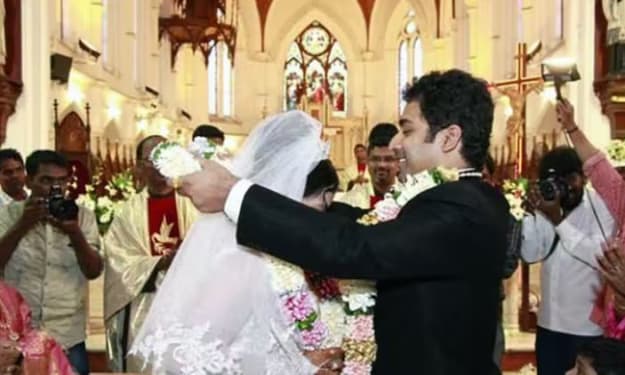What Are Some Amazing Rituals And Traditions for Muslim Weddings?
Muslim Wedding

Wedding in varying cultures and religions offer unique charm and fun experience that is so different from one another. Marriage in any culture is a big and special day for couples. If we talk about Muslim culture, we understand that their marriage rituals are highly embedded with their religious beliefs. The Muslim wedding is considered to be sacred and filled with the loving bond of two souls coming together to form a union. Muslim wedding lasts for about three days and is also known as Nikah.
In Muslim culture, the wedding has tons of amazing rituals that can be observed in pre-wedding, wedding and post-wedding ceremonies. Muslim weddings may feel formal from afar but it the most colourful and amazing wedding ceremonies. A lot of money is spent on wedding celebrations to ensure a memorable experience for wedding guests, families and couples. Here are some amazing Muslim wedding rituals that you should know about.
Salatul Ishtikara
Arrange marriages are quite a norm in Muslim culture. Hence, when the family members have found a suitable match for their son or daughter a formal meeting is held. Within the meeting, all the marriage discussions are formalized regarding the couple's future. Once the match is fixed and marriage discussions finalized, the family goes on to inform the religious head of the decision.
These religious heads are seeking to help the future couple get blessings and consent from Allah. Salatul Ishtikara also known as the special prayer done to help officiate the wedding for the future couple. In the Muslim wedding tradition, this is the first and vital pre-wedding ritual to follow.
Imam Zamin
This is the next pre-wedding ritual in a Muslim wedding. This ritual marks the acceptance of the bride within the future groom's family. The future mother in law house is required to visit the Muslim bride and come bearing gifts such as sweets, gold coins, gifts, etc. A silk scarf containing the gold or silver coin is then tied around the bride's wrists by the groom’s mother. This ritual is a way to reassure the bride that she is welcome in the groom's family.
Ring Ceremony
The ring ceremony also known as mangni or engagement is a public declaration of the coming together of the bride and groom's family. In this function, all the relatives loved ones and friends of the future couple witness the ring exchange. The date is fixed and the ceremony takes place which signifies their formal engagement as a couple. The future couple is given gifts, blessings, fruits, money, etc by their guests. The rings are the symbol of their commitment to one another.
Manjha
The Haldi ceremony or Manjha as called in Muslim weddings is also a pre-wedding ritual. In this wedding ritual, the groom's family side sends over rose or sandalwood-infused turmeric paste for the bride. This ritual takes place a day or two before the wedding ceremony.
The bride on this day adorns yellow colour clothing. All the guests apply turmeric paste on the bride’s body parts like the face, legs, hands, etc. This ceremony is exciting, fun and filled with happy times. The same ceremony also happens at the groom's place. This ceremony is done to add a natural glow and beauty to the couple for their special day.
Heena Time
It is a women-centric Muslim wedding ritual in which the bride's side takes part. In this ceremony, the Mehendi artists adorn the bride's hands and legs with Heena paste. Heena designs are done with lots of care and beautifully designed with the groom's initials hidden somewhere. Heena drawing and designing can be time-consuming but relaxing time. The ceremony also includes food and dancing. Several matrimony sites offer exceptional Heena application services for wedding brides at affordable rates.
Sanchaq
This final pre-wedding Muslim wedding ritual is an important wedding tradition. In this ceremony, the groom's family comes to visit the bride along with her family bearing gifts. The gifts include perfumes, bridal outfits, sweets, etc that are required for the wedding day. The wedding gifts given by the groom's family are referred to as Sanchaq which highlights the love and support of the groom's family.
Baraat
The groom's arrival is signalled with baraat on the Nikah day. The groom arrives on the doorstep of the wedding venue in a beautifully decorated horse or car. He is escorted by the bride's family members, loved ones and wedding guests. It is a fun, loud and exciting time with a celebratory mood where lots of cheering goes on the groom's arrival at the wedding venue.
As the baraat reaches the Muslim marriage site, he is given a splendid welcome by the bride's family. The groom's party is given a special welcome and wedding drink known as sherbet and sweets on arrival.
Nikah
Nikah or the main wedding ceremony is a grand affair at a Muslim wedding. During this ceremony, the woman side on one side, and the man sitting on another side. The Maulvi the religious leader then reads the verses of their religious book Quran. The prayers are recited to offer a blessing to the couple. The maulvi then asks both the bride and groom for their consent three times after which the wedding ceremony comes to completion.
Arsi Mushraf is a ritual that is conducted right after the marriage's consent. It is the first time when the groom and bride see each other through the mirror reflection. The final step includes signing the legal marriage certificate.
Fatiha
It is another crucial and significant Muslim marriage ritual. The first chapter of the holy book Quran is read to seek blessing for the married couple. The ceremony is symbolic in the sense that it offers Allah protection and guidance to a newly married couple. It is an intimate affair and after the ceremony, both the couple's family enjoys coffee and baklava.
Rukhust
It is the post-wedding Muslim ritual and is known as Rukhust. It is the time when the Muslim bride says goodbye to her loved ones and family. The bride's family gets emotional and teary at the thought of her leaving them. After the farewell, the bride is taken to the groom's house where she is welcomed by her mother-in-law and family. The bride is then presented with Holy Quran to help signify her marriage commitment and duties.
To conclude, the last post-marriage ceremony Dawat-e-dalimah is a grand reception given by the groom's side. It is a grand affair that is attended by loved ones, relatives, friends, and family to give a blessing to the newlywed. The ceremony feels like a festival where lots of dancing, eating, and entertainment happen. As a Muslim bride or groom, you can understand that wedding rituals and ceremonies are closely bound to religious beliefs. Muslim marriages are beautiful experiences and unique at the same time.
Once you have attended a Muslim wedding, you will relish it for a lifetime. Online matrimonial sites offer one-stop and customized Muslim wedding celebrations for their clients. Wedding experts take care of all wedding functions and ensure their clients can enjoy their big day.
Matrimonialsindia.com offers exclusive wedding ideas, themes, etc, to help cater to the modern Muslim bride and groom. Our wedding services are affordable, outstanding, and in tune with our client's wedding needs and budgets for maximum value creation.
About the Creator
Balakrishnan David
Balakrishnan is a digital marketer and blogger. He also writes unique and research-driven content about business, Matrimonial, and career.
Enjoyed the story? Support the Creator.
Subscribe for free to receive all their stories in your feed. You could also pledge your support or give them a one-off tip, letting them know you appreciate their work.






Comments
There are no comments for this story
Be the first to respond and start the conversation.